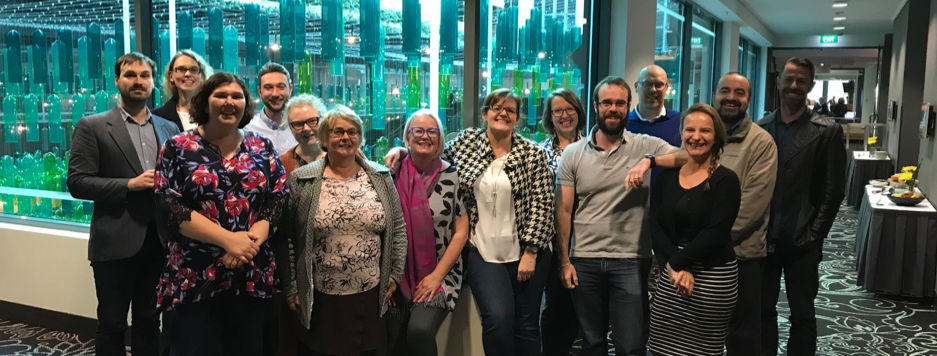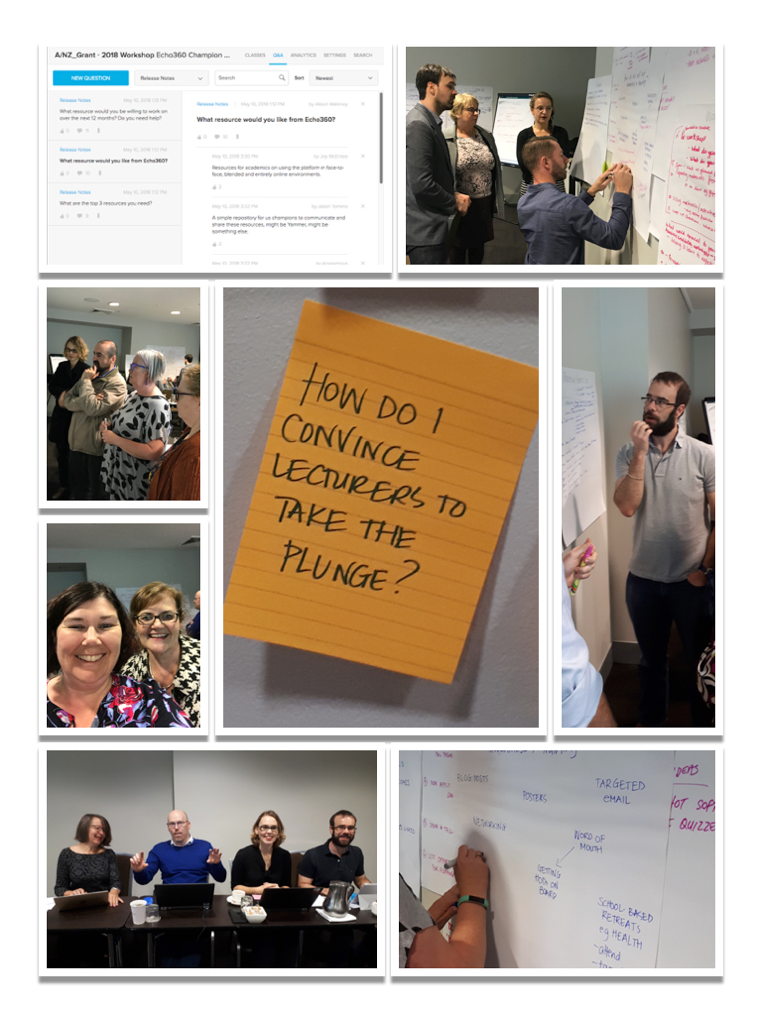Announcing Echo360’s Australian and New Zealand Academic Champion Grant Winners

In March this year, the Echo360 team in Australia and New Zealand were excited to announce the launch of our 2018 Academic Champion Grants. First and foremost, the idea of the grants was to gather a team of interested people together from a range of institutions and roles and, over the course of 12 months to talk about, think about, share and plan for the adoption of Echo360 in environments where many educators are already feeling over-worked and exhausted by change. The grant itself provides funds to help support Echo360 initiatives at each of the champions’ institutions. Additionally, the successful grant winners participate in an intensive two-day workshop at the start of the program, as well as meet online each month, helping to create a support network and knowledge base required for successful adoption of Echo360 beyond lecture capture. They are also invited to participate in an Echo360 A/NZ Community Conference where they can share their story and the knowledge they have gained with their peers.
Echo360 is lucky to have Alison Maloney (Manager, Academic Development) leading the grants program; she is an educator with over 15 years’ experience in professional development and over two years’ experience with Echo360, making her ideally positioned to guide and support our champions throughout the program.
In publicising the grants, we wrote “Our champions are on a quest to change learning and teaching and are excited to talk about the opportunities with Echo360 beyond lecture capture”. Selection for the grants was a highly competitive process during which, among other criteria, applicants were required to submit a three-minute video presentation outlining one thing that they thought academics should know about learning and teaching. After carefully evaluating dozens of submissions across the full breadth of the educational landscape including universities, colleges and vocational institutions, we chose 12 awardees.
- Collarts: Jason Torrens
- Curtin University: Diana Taylor
- Curtin University: David Garrett-Reed
- Griffith University: Simone Poulsen
- Swinburne University of Technology: David Yammouni
- TAFE Queensland: George Clegg
- The University of Adelaide: Joy McEntee
- Unitec Institute of Technology (NZ): Sarah Kirk
- University of Otago (NZ): Tosh Stewart
- University of Tasmania: Janine Tarr
- University of Tasmania: Ryan Brunton
- Victoria University: Rosy Borland
Students Learn by “Doing”
At the centre of the Academic Champion grant is a two-day on-site workshop with a pedagogically-driven agenda focused on identifying and overcoming barriers to adoption of both video-based and active learning methods in the classroom. We took a blended approach with some small group, whole group, individual and online response sessions using a range of resources including the humble post-it as well as the technology available in the Echo360 platform.
The workshop began with a conversation about Everett’s diffusion of innovation theory, a theory that attempts to explain how, why, and at what rate new ideas and technology spread. Attendees were asked to evaluate current adoption of Echo360’s active learning features at their institution and then work together to identify what types of resources, marketing and language could be used to appeal to individuals with different responses to innovation.
Further sessions incorporated a range of active learning strategies and required participants to think about content, process information and communicate in a variety of ways. It was itself an active learning experience.
As well as practical demonstrations including Echo360’s platform in use in an active learning environment, the 2 days included sessions on creating training opportunities, the importance of audio, matching the active learning features to the pedagogy and with the help of Echo360 APAC’s newest relationship manager, Leah Chandler (who was recently managing the platform at a University herself) how, if you are trying to increase adoption, your Echo360 Administrator should be your best friend!
By the end of the workshop, participants were clearly inspired and mentally exhausted having graciously given of themselves through their ideas, feedback and support of each other throughout the two days. Attendees walked away with a greater understanding of how they might use Echo360 and feel better equipped to communicate and demonstrate how Echo360 video learning and engagement tools can be used in ways that reach beyond surface learning. One piece of feedback even included, ‘best.workshop.ever!’
Goals and Next Steps
Our Academic Champions have returned to their institutions with new ideas, strategies, plans and resources to further develop, adopt and support the use of video-based learning in their own classes, and motivate colleagues within their department and at their institution. Just one month after the workshop we are hearing of teams changing the focus of their messaging away from lecture capture, (after all, isn’t that now the norm?), new trials to look at which of Echo360’s features best suit which teaching environment and even one participant who returned to their university and applied for an internal grant to support the ‘Partnering with Students’ project she was inspired to create.
We have begun the remote monthly sessions where we are delving more deeply into what change we’re seeing at each institution, internal support including communication plans and badging, new and upcoming features and how we can further enhance the student experience whilst exposing insight into their learning via Echo360 analytics.
While the workshop was a critical part of launching the grant, the relationships that began over those two days are evidenced in the online community that is used to share resources, to support each other when the inevitable resistance occurs and share the good news when teaching and learning has been changed!

